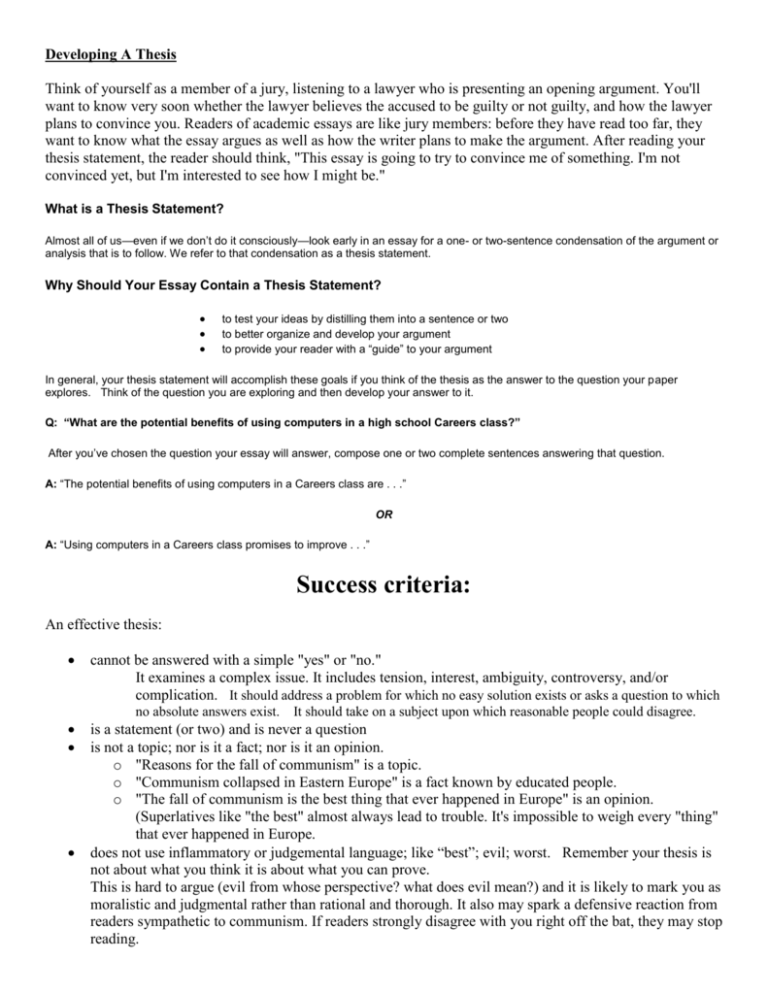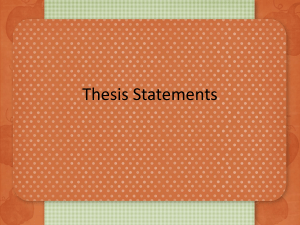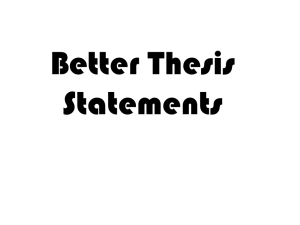What is a Thesis Statement?
advertisement

Developing A Thesis Think of yourself as a member of a jury, listening to a lawyer who is presenting an opening argument. You'll want to know very soon whether the lawyer believes the accused to be guilty or not guilty, and how the lawyer plans to convince you. Readers of academic essays are like jury members: before they have read too far, they want to know what the essay argues as well as how the writer plans to make the argument. After reading your thesis statement, the reader should think, "This essay is going to try to convince me of something. I'm not convinced yet, but I'm interested to see how I might be." What is a Thesis Statement? Almost all of us—even if we don’t do it consciously—look early in an essay for a one- or two-sentence condensation of the argument or analysis that is to follow. We refer to that condensation as a thesis statement. Why Should Your Essay Contain a Thesis Statement? to test your ideas by distilling them into a sentence or two to better organize and develop your argument to provide your reader with a “guide” to your argument In general, your thesis statement will accomplish these goals if you think of the thesis as the answer to the question your paper explores. Think of the question you are exploring and then develop your answer to it. Q: “What are the potential benefits of using computers in a high school Careers class?” After you’ve chosen the question your essay will answer, compose one or two complete sentences answering that question. A: “The potential benefits of using computers in a Careers class are . . .” OR A: “Using computers in a Careers class promises to improve . . .” Success criteria: An effective thesis: cannot be answered with a simple "yes" or "no." It examines a complex issue. It includes tension, interest, ambiguity, controversy, and/or complication. It should address a problem for which no easy solution exists or asks a question to which no absolute answers exist. It should take on a subject upon which reasonable people could disagree. is a statement (or two) and is never a question is not a topic; nor is it a fact; nor is it an opinion. o "Reasons for the fall of communism" is a topic. o "Communism collapsed in Eastern Europe" is a fact known by educated people. o "The fall of communism is the best thing that ever happened in Europe" is an opinion. (Superlatives like "the best" almost always lead to trouble. It's impossible to weigh every "thing" that ever happened in Europe. does not use inflammatory or judgemental language; like “best”; evil; worst. Remember your thesis is not about what you think it is about what you can prove. This is hard to argue (evil from whose perspective? what does evil mean?) and it is likely to mark you as moralistic and judgmental rather than rational and thorough. It also may spark a defensive reaction from readers sympathetic to communism. If readers strongly disagree with you right off the bat, they may stop reading. is clear and specific; not vague (keep asking yourself why?) It addresses one main idea. Use the four questions to focus your research efforts. TOPIC: I am researching _______________________ and its contribution to, development, or effect on _______________________________. IMPLIED QUESTION: Because I want to find out who, what, where, when, whether or how __________________________________________________________________ REASON: In order to understand, examine or explain how, what or why _____________________________________________________________________ SIGNIFICANCE: So that ______________________________________________ has two parts. It should tell what you plan to argue, and it should "telegraph" how you plan to argue how you plan to provide support for your thesis and using what evidence takes a stand on an issue. It should attempt to convince the readers of something, change their minds about something or urge them to do something. It should present a position that readers could disagree with realistically. deal with a subject that can be adequately treated given the nature of the assignment (make sure the scope is not too broad) should assert the conclusion clearly; don’t use words that show indecision (may) includes counter-arguments effectively (anticipates what arguments could be made against your argument) (Every argument has a counter-argument; If yours doesn't, then it's not an argument—it may be a fact, or an opinion, but it is not an argument.) An example is given below: Michael Dukakis lost the 1988 presidential election because he failed to campaign vigorously after the Democratic National Convention. This statement is on its way to being a thesis. However, it is too easy to imagine possible counter- arguments. For example, a political observer might believe that Dukakis lost because he suffered from a "soft-on-crime" image. If you complicate your thesis by anticipating the counter-argument, you'll strengthen your argument, as shown in the sentence below. While Dukakis' "soft-on-crime" image hurt his chances in the 1988 election, his failure to campaign vigorously after the Democratic National Convention bore a greater responsibility for his defeat. Let’s see how to generate a thesis statement for a social policy paper. Brainstorm the topic. Let’s say that your class focuses upon the problems posed by changes in the dietary habits of Americans. You find that you are interested in the amount of sugar Americans consume. You start out with a thesis statement like this: Sugar consumption. This fragment isn’t a thesis statement. Instead, it simply indicates a general subject. Furthermore, your reader doesn’t know what you want to say about sugar consumption. Narrow the topic. Your readings about the topic, however, have led you to the conclusion that elementary school children are consuming far more sugar than is healthy. You change your thesis to look like this: Reducing sugar consumption by elementary school children. This fragment not only announces your subject, but it focuses on one segment of the population: elementary school children. Furthermore, it raises a subject upon which reasonable people could disagree, because while most people might agree that children consume more sugar than they used to, not everyone would agree on what should be done or who should do it. You should note that this fragment is not a thesis statement because your reader doesn’t know your conclusions on the topic. Take a position on the topic. After reflecting on the topic a little while longer, you decide that what you really want to say about this topic is that something should be done to reduce the amount of sugar these children consume. You revise your thesis statement to look like this: More attention should be paid to the food and beverage choices available to elementary school children. This statement asserts your position, but the terms more attention and food and beverage choices are vague. Use specific language. You decide to explain what you mean about food and beverage choices, so you write: Experts estimate that half of elementary school children consume nine times the recommended daily allowance of sugar. This statement is specific, but it isn’t a thesis. It merely reports a statistic instead of making an assertion. Make an assertion based on clearly stated support. You finally revise your thesis statement one more time to look like this: Because half of all American elementary school children consume nine times the recommended daily allowance of sugar, schools should be required to replace the beverages in soda machines with healthy alternatives. Notice how the thesis answers the question, “What should be done to reduce sugar consumption by children, and who should do it?” When you started thinking about the paper, you may not have had a specific question in mind, but as you became more involved in the topic, your ideas became more specific. Your thesis changed to reflect your new insights. How to Tell a Strong Thesis Statement from a Weak One 1. A strong thesis statement takes some sort of stand. Remember that your thesis needs to show your conclusions about a subject. For example, if you are writing a paper for a class on fitness, you might be asked to choose a popular weight-loss product to evaluate. Here are two thesis statements: There are some negative and positive aspects to the Banana Herb Tea Supplement. This is a weak thesis statement. First, it fails to take a stand. Second, the phrase negative and positive aspects is vague. Because Banana Herb Tea Supplement promotes rapid weight loss that results in the loss of muscle and lean body mass, it poses a potential danger to customers. This is a strong thesis because it takes a stand, and because it's specific. 2. A strong thesis statement justifies discussion. Your thesis should indicate the point of the discussion. If your assignment is to write a paper on kinship systems, using your own family as an example, you might come up with either of these two thesis statements: My family is an extended family. This is a weak thesis because it merely states an observation. Your reader won’t be able to tell the point of the statement, and will probably stop reading. While most American families would view consanguineal marriage as a threat to the nuclear family structure, many Iranian families, like my own, believe that these marriages help reinforce kinship ties in an extended family. This is a strong thesis because it shows how your experience contradicts a widely-accepted view. A good strategy for creating a strong thesis is to show that the topic is controversial. Readers will be interested in reading the rest of the essay to see how you support your point. 3. A strong thesis statement expresses one main idea. Readers need to be able to see that your paper has one main point. If your thesis statement expresses more than one idea, then you might confuse your readers about the subject of your paper. For example: Companies need to exploit the marketing potential of the Internet, and Web pages can provide both advertising and customer support. This is a weak thesis statement because the reader can’t decide whether the paper is about marketing on the Internet or Web pages. To revise the thesis, the relationship between the two ideas needs to become more clear. One way to revise the thesis would be to write: Because the Internet is filled with tremendous marketing potential, companies should exploit this potential by using Web pages that offer both advertising and customer support. This is a strong thesis because it shows that the two ideas are related. Hint: a great many clear and engaging thesis statements contain words like because, since, so, although, unless, and however. 4. A strong thesis statement is specific. A thesis statement should show exactly what your paper will be about, and will help you keep your paper to a manageable topic. For example, if you're writing a seven-to-ten page paper on hunger, you might say: World hunger has many causes and effects. This is a weak thesis statement for two major reasons. First, world hunger can’t be discussed thoroughly in seven to ten pages. Second, many causes and effects is vague. You should be able to identify specific causes and effects. A revised thesis might look like this: Hunger persists in Glandelinia because jobs are scarce and farming in the infertile soil is rarely profitable. This is a strong thesis statement because it narrows the subject to a more specific and manageable topic, and it also identifies the specific causes for the existence of hunger. Thesis development http://owl.english.purdue.edu/owl/resource/545/1/ On-line thesis builder http://www.ozline.com/electraguide/thesis.php








